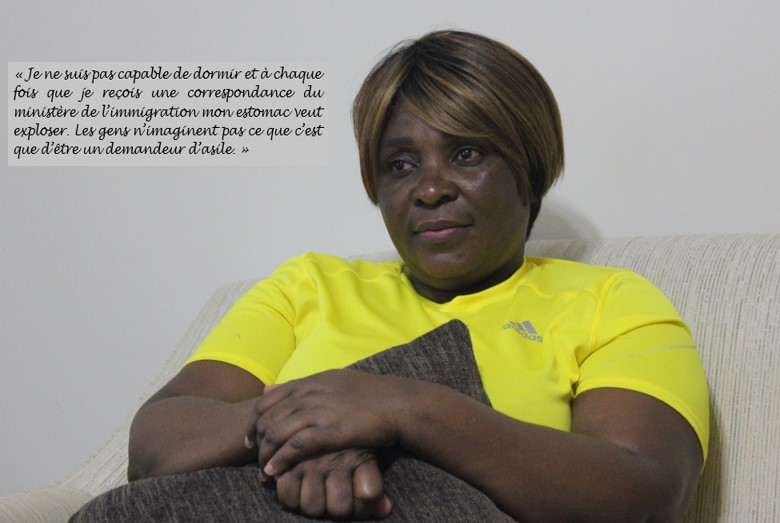I would like to tell you about the journey of an asylum seeker in Canada. As we know, such a person arrives without a permit or visa and asks for government protection because their life is threatened in their country of origin. Often crossing continents, she had to face immense obstacles and difficulties before finally reaching Canadian soil.
Once there, she begins to work while waiting for the day when she will appear before a judge. This magistrate will decide his fate. Asylum seekers are often fearful and generally prefer not to tell their story. Leret Fataki is an exception to this rule. Thank you for agreeing to share your experience with you and me.
Through her words, I want to give a voice to those who, like her, have lost everything and left everything behind. Who arrive here with only hope as their baggage. Leret Fataki, 44, now works as a caregiver at a retirement home in Cowansville. Arriving in the country last November 30th via the very controversial Roxham* road, she decided to settle here while waiting to appear before the judge who will decide her fate: granting her permanent residency status or deportation.
Originally from the Democratic Republic of the Congo (DRC), this mother of four children was left in the care of her mother and sister there. In fact, she had to leave the country four years ago after an attack on her husband and her. He lost his life, but she survived and fled to neighboring Angola.
“My country is rich, she told me, but we are so poor. I worked as an elementary school teacher, but my salary was miserable. My husband and I decided to get involved in politics, but tribal rivalries were rampant in the DRC, our presidential candidate wasn’t elected, and they wanted to kill us. »
In Angola she is learning Portuguese in order to stay there until the Congo government changes, she hopes, and she can return home. However, when Congolese immigrated to this neighboring country in large numbers during the many wars of extermination that marked their history, the Angolan government was unwilling to take in more and instead sought to bring them back home.
Like many of her compatriots, Leret Fataki will therefore travel to Brazil, another Portuguese-speaking country, with her Angolan passport, which she has now acquired.
“In the Congo, a passport is a luxury,” she explained to me. Most people don’t have one because you either eat or have one. »
Arriving in Rio de Janeiro, she finds accommodation in the favela of Jacarezinho, one of the most disadvantaged black areas of the metropolis. In order to survive, she must decide to sell various items on the street, umbrellas, hats, in short anything she can eat. However, she says she never felt like an outsider in Rio. For him it was like Africa.
She was there on May 6, 2021 when more than 25 people were killed in her neighborhood in what Amnesty International has described as a massacre. Frightened, she sets off on foot with other residents of Jacarezinho to reach the border between Brazil, Colombia and Peru.
Every day, thousands of migrants take this dangerous route, crossing the Amazon jungle to reach the tropical forests of Darien, where they have to take a passage considered one of the most dangerous in the world.
Leret Fataki recalls that very special moment when she was about to board the small boat that would take her to Colombia on the Amazon:
“I thought of my children and all the people I knew who died on this road. I decided to go back and returned to Rio determined to find another way to get to Canada,” adding that for thousands of others in their situation, Canada is the only safe place in America.
At the Mexican embassy in Sao Polo she gets a two-month tourist visa for Mexico City. Then, in the fall of 2021, like many before her, she attempted to cross the Rio Bravo (or Rio Grande, the border river between Mexico and the United States), whose treacherous waters have already washed away many lives. Her only possessions are the clothes she wears and her cellphone, which she has tied to her head with a bandana to keep it from getting wet and the water reaching her neck.
In the United States she is being held in a detention center. When she lost her Angolan passport in the deep waters of the Rio Bravo, we quickly set up an appointment with a judge.
“I knew they wanted to deport me, she confides, and I told myself I would have to cross the Canadian border before my hearing was scheduled for January 6, 2022. But the borders were closed because of the pandemic. We have all prayed very fervently for them to reopen. »
While waiting for this long-awaited moment, she is staying in a Portland hostel set aside for migrants. Upon departure, he is provided with food, clothing and advice for crossing the border.
She took over Roxham Road on 30th November 2021, exactly 9 days after the borders reopened. Since her only identity document is a copy of her Congolese voter’s card, she will be held in Lacolle for a week, where she will pass various hearings before finally being allowed to enter the country.
On December 9, she arrives at the YMCA in Montreal and then begins a two-month training course as a beneficiary.
“It’s a way of making a living but also helping others and I wanted to help,” she explains. The volunteers in the senior centers helped me a lot. I’ll never forget that and I told myself that once I was installed I too would become a volunteer and help others like they did for me. »
Nathalia Guerrero Velez
___________________________________________
* Roxham Road is the passage that crosses the Canada-US border from the small town of Champlain, New York, USA. On the Quebec side, it is in the small community of Saint-Bernard-de-Lacolle in Montérégie, about 40 miles south of Montreal. The point of arrival is just minutes from the Canada Border Services Agency.
After being closed during the pandemic, the federal government reopened the trail in November 2021. But for several months, the Quebec government has been demanding the closure of this irregular passage, which hundreds of asylum seekers use every day in search of a better life.

Twitter enthusiast. Organizer. Explorer. Reader. Zombie aficionado. Tv specialist. Thinker. Incurable internet maven.



;Composite=(type=URL,url=https://images.radio-canada.ca/v1/assets/elements/16x9/outdated-content-2015.png),gravity=SouthEast,placement=Over,location=(0,0),scale=1)

;Composite=(type=URL,url=https://images.radio-canada.ca/v1/assets/elements/16x9/outdated-content-2016.png),gravity=SouthEast,placement=Over,location=(0,0),scale=1)
;Composite=(type=URL,url=https://images.radio-canada.ca/v1/assets/elements/16x9/outdated-content-2020.png),gravity=SouthEast,placement=Over,location=(0,0),scale=1)
